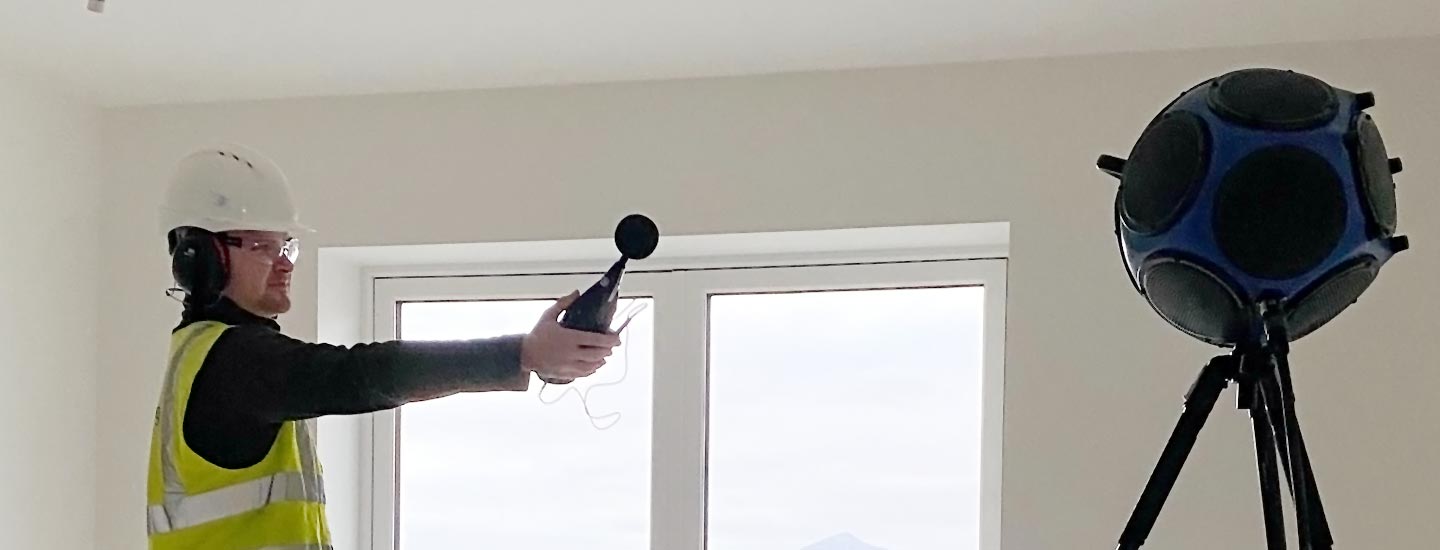Measurement and Testing in Building Acoustics
The measurement and testing of building acoustics are essential to ensuring compliance with regulatory requirements and achieving the intended design goals. These processes assess sound insulation, reverberation control, and overall acoustic comfort, forming a critical part of delivering high-quality buildings. At AWN Consulting, we provide expert advice on compliance with Irish Building Regulations, commissioning tests, and forensic testing. With a large catalogue of calibrated scientific measurement equipment, we are equipped to deliver precise and reliable results for any project.
Part E of the Irish Building Regulations
In Ireland, Part E of the Building Regulations sets the minimum standards for sound insulation in residential buildings, including new builds, conversions, and material changes of use. Its purpose is to safeguard occupants from noise transmission through walls, floors, and ceilings. The requirements address both airborne noise, such as conversations or music, and impact noise, such as footsteps or dropped objects. Part E specifies performance standards for separating structures, measured in terms of airborne and impact sound insulation, which must be verified through field testing.
Pre-completion acoustic testing is required to demonstrate compliance with Part E. These tests ensure that the completed construction performs as intended, particularly in cases where bespoke or non-standard construction methods are employed. AWN staff are registered testers with the Sound Insulation Testing Register in Ireland (SITRI)
Commissioning Tests at Project Completion
Commissioning tests are conducted at the end of a construction project to verify that the building achieves its acoustic design targets. These tests are essential for confirming compliance with regulations and ensuring occupant satisfaction. Common commissioning tests include:
- Airborne Sound Insulation Testing: Assessing how effectively walls, floors, and ceilings block airborne noise.
- Impact Sound Insulation Testing: Measuring how well structures attenuate impact noise, such as footsteps, using specialised tapping machines.
- Reverberation Time Testing: Determining how quickly sound decays in rooms such as offices, schools, or auditoria, ensuring clarity and comfort.
Our extensive range of calibrated measurement equipment, including sound level meters, tapping machines, and reverberation time analysers, allows us to carry out these tests with precision. This ensures that the data collected is highly accurate, providing a reliable basis for certifying compliance and resolving any discrepancies between design and construction.
Forensic Testing to Resolve Issues
Even with meticulous planning, acoustic problems can occasionally arise post-completion. Forensic acoustic testing is used to diagnose the root cause of issues such as excessive noise transmission or poor sound quality. At AWN Consulting, we employ advanced diagnostic techniques and state-of-the-art equipment to investigate:
- Construction defects, such as gaps in insulation or poorly sealed joints.
- Flanking transmission paths that allow sound to bypass intended barriers.
- Material performance variations or installation errors.
By identifying the sources of acoustic issues, we provide targeted and practical solutions, whether through remedial construction or design adjustments.
Through our expertise, advanced equipment, and rigorous approach, AWN Consulting ensures that buildings meet acoustic standards while enhancing the comfort and well-being of their occupants.









